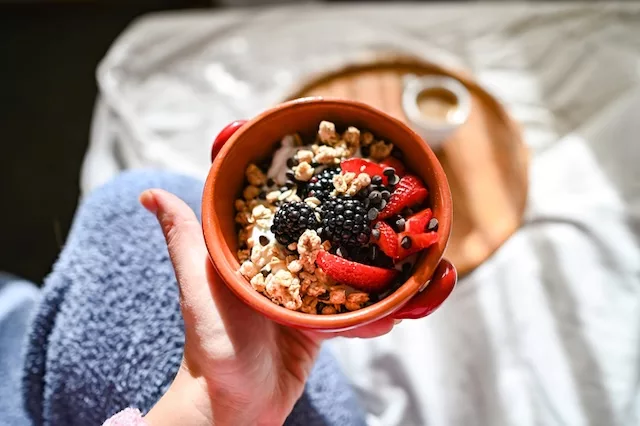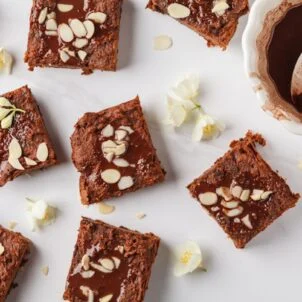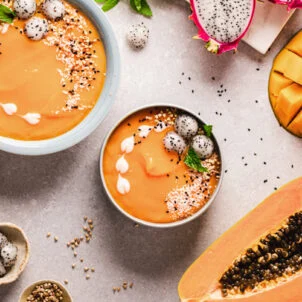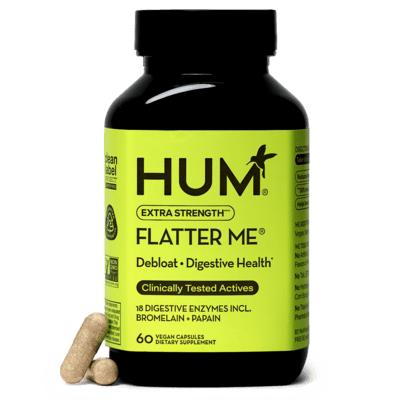They say breakfast is the most important meal of the day. That’s why we’re bringing you some of the best no-bloat breakfast ideas that will have you feeling energized and bathing suit ready this summer season. Get ready for bloating relief at the top of your day!
The way you start your mornings can set the scene for the rest of the day. Opting for more nutritious and healthy breakfast ideas as opposed to sugary, carb-heavy go-tos like bagels, toast, waffles, and so on can help you feel more awake, energized, and can even keep bloating at bay.

“When it comes to beating the bloat, the key is to focus on foods that are naturally easy to digest, provide steady energy, and support your gut, not stress it,” says Jennifer Nicole Bianchini, MS, RD, IFNCP, RYT.
Food triggers that lead to bloating can vary from person to person, so finding the best no-bloat breakfasts for you can take some trial and error. But starting with a balanced meal containing foods like eggs, fruit, veggies, and even oats can help set you up for success and avoid uncomfortable puffiness and bloating.
In this article, we explore breakfasts for bloating relief. Read on for more ideas and insights.
Healthy Breakfast Ideas That Won’t Trigger Bloating
Eggs: Some people with egg sensitivity might bloat if they add this common breakfast food to their plate. However, Bianchini says the complete protein is easy to digest for most people and a super versatile breakfast choice. “Scrambled, hard-boiled, or poached eggs can keep you satisfied without leaving you feeling heavy.”
Chicken Sausage: While a lot of the popular breakfast meats can lead to bloating, Bianchini says chicken sausage is a great alternative to its greasy counterparts. “Just make sure to look for a brand that is low in sodium, does not contain nitrates, and is free from fillers, preservatives, and added sugars, as these can all increase the potential for bloating.”
Fruit: Some fruit can also help ward off bloat and be added to your breakfast plate for added nutrients (and something sweet!). “Berries are rich in anthocyanins and prebiotic polyphenols, which have been shown to help reduce inflammation, a common trigger of puffiness,” says Jenna Volpe, RDN, LD, CLT of Whole-istic Living. “Berries are also generally low in FODMAPs (fermentable oligosaccharides, disaccharides, monosaccharides, and polyols), so they’re less likely to trigger bloat compared to most other types of fruit.” Some other fruit for breakfast options include pineapple, which Volpe says is a low FODMAP fruit that contains bromelain, an enzyme that supports natural digestion.
Veggies: When in doubt, vegetables are always a great, go-to healthy breakfast idea that won’t cause bloating. Bianchini says to add more veggies like spinach, zucchini, or tomatoes to your plate as these are packed with fiber and antioxidants, plus they contain a lot of water, which can also help reduce bloating.
Oats: If you want more carbs in the morning, Bianchini recommends eating oats for breakfast, since they’re a great fiber source and typically don’t lead to bloating either. As a tip, she recommends adding a scoop of vegan protein powder or collagen to your oatmeal to help balance blood sugar and minimize bloating induced by potential carb overload.
Greek Yogurt & Cottage Cheese: “Greek yogurt and cottage cheese are great breakfast options that are high in protein and contain probiotics, which are beneficial for gut health and help prevent bloating,” says Bianchini. With that said, these healthy breakfast ideas are also prone to added sugars and artificial sweeteners, so she recommended reading the label closely to ensure you select the plain flavor. For added nutritional value, add fruit and chia seeds for more fiber.
FAQs on Bloating Relief
What Breakfast Foods Make You Bloat?
Sadly, lots of the breakfast foods we know and love can cause bloating and aren’t actually a nutritious way to start off our day. Bianchini says some of the biggest culprits include pancakes, waffles, French toast, muffins, and croissants because they are “all heavy in refined carbohydrates and sugars, which can spike blood sugar, cause water retention, and slow digestion.”
Breakfast cereals (including those that claim to be “healthy”) are also typically loaded with added sugars and don’t have an adequate amount of fiber to provide the body with the nutrients it needs to stabilize blood sugar spikes and crashes and keep bloating at bay. Similarly, highly processed breakfast bars are usually loaded with hidden sugars and, according to Bianchini, super tough on the digestive system.
The greasy and fried breakfast foods we know and love to order at a local diner are also no-nos if you’re trying to reduce bloating. “High-fat, fried foods like bacon, hash browns, or even certain breakfast sandwiches are filled with sodium and unhealthy fats, which can slow down digestion and leave you feeling heavy and bloated,” says Bianchini.
Volpe also says to be wary of FODMAP foods such as whole wheat bread, regular milk and cream, and even seasonings like garlic and onions, which are commonly used in savory breakfasts like omelets and everything bagel seasoning. “Some of the most common types of bloat-causing breakfast foods are high FODMAP foods,” she notes.
Is It Better to Eat Hot or Cold Food?
When it comes to food temperature, Bianchini says it’s not so much about hot vs. cold and is instead important to look at the quality of ingredients and how your body feels when consuming them. “In summertime, many people prefer cooler over warmer foods due to the hot weather,” she notes. “However, some people find warm foods easier to digest, especially first thing in the morning, because warmth naturally helps stimulate digestion and feels more grounding.”
With that said, she notes that you can absolutely eat a cold breakfast—such as Greek yogurt with berries, a protein smoothie, or overnight oats—and feel great (and less bloated), so long as you choose low-sugar and nutrient-rich options. “It’s more important to prioritize balanced meals rich in protein, healthy fats, fiber, and complex carbs than it is to worry about the temperature of your meal.” When experimenting with hot vs. cold breakfast ideas, tune into your body and pay attention to how your gut responds to your diet.
The Takeaway on Bloating Relief Breakfasts
In addition to choosing healthy breakfast ideas to reduce the risk of bloating, Volpe recommends tuning into your food habits, especially if you’re someone who eats fast. “The more we slow down to eat mindfully and chew our food regularly—regardless of what we are eating—the less likely we are to experience bloating,” she notes. “That’s because chewing helps reduce the likelihood of undigested food particles reaching our intestines and fermenting.” Slowing down while eating can also stimulate the cephalic phase of digestion, which Volpe notes can increase digestive sufficiency.

Gut Feelings: How to Choose Cooking Oils That Won’t Leave You Bloated

Bloat-Free Brownie Bites: A Delicious High-Fiber Snack

Bloated? A Duo That May Help: Why Navel Pulling is Trending and Flatter Me Is In






